Wine and Crime: Stories From the First CrimeCon Convention
Filmmakers Kelsey and Rémy Bennett attended Oxygen network’s first CrimeCon convention in Indianapolis to uncover the reasons why so many women are fascinated with true crime
Why are we obsessed with crime and violence? Personal stories from the true crime devotees in attendance at the first CrimeCon convention.
By Kelsey and Rémy Bennett


For years, I was obsessed with true crime. But when I read John Gilmore’s Severed, the historical true crime story of the unsolved Black Dahlia case, I became deeply and unexpectedly disturbed. As I went over the author’s description of the murder, I continuously flipped back to the crime scene photo of Elizabeth Short’s severed, bloodless body left in a vacant lot near Leimert Park in LA, and the closeup forensic shot of her face with a gaping slit — cut ear to ear — that looked like a nightmarish wound of a smile. I became lost in Elizabeth Short. I was haunted by her flesh and I sank into her sadness. I wasn’t used to being affected by true crime in this way and I felt suffocated by her fear. I was afraid for her and then I felt afraid for myself. The terror was so strong that I had to take a break from reading about true crime until the overwhelming imagery faded.
With enough time and distance from the Black Dahlia murder to safely immerse myself once again in crime cases, I wander through the Marriott in Indianapolis at Oxygen’s first CrimeCon, surrounded by people who are as dedicated to the genre as I used to be. The venue is filled with women wearing t-shirts declaring, “Might as well be a Detective.” There are mothers who brought their daughters as graduation presents, and daughters who brought their mothers for their birthdays.
“Of course women are interested in true crime — the majority of victims are women.”
Initially, when I ask women why they’re drawn to true crime, I’m given generalizations: Women love solving cases because they’re more sensitive and intuitive or they’re good at keeping track of details. But it isn’t until one woman says, “Of course women are interested in true crime — the majority of victims are women,” that I really feel like I’m getting somewhere.
Through my conversations with these women, I discover a lot of them were personally affected by crime or abuse themselves. Jane Carson-Sandler, who was the fifth rape victim of The Golden State Killer, says, “A lot of us have our own stories, and when you come here, it actually frees you to be able to share those stories with someone else.” A 17-year-old woman going to the University of Texas at Austin tells me the first thing she wants to do when she gets to school is start a rape hotline. She says that knowing 15 percent of female undergraduates at UT Austin have reported being raped, she wants to create a support system for other women.
At CrimeCon, we all share a fascination for the killer’s psychology, a drive to discover the reasons behind their motivations, an obsession with the case details and a passion for uncovering who committed the crime and why. But, there is also an overarching comradery, allegiance and level of support among these women. They’re able to relate to the victim in the same way that I did to Elizabeth Short. Inspired by the realization that they or a loved one could be the victim of a violent crime, the women I spoke with revealed a strength and drive to protect each other.
“It’s not just one here and one there,” a professor of criminal law and survivor of abuse tells me. “It’s millions of us everywhere who have these experiences.”

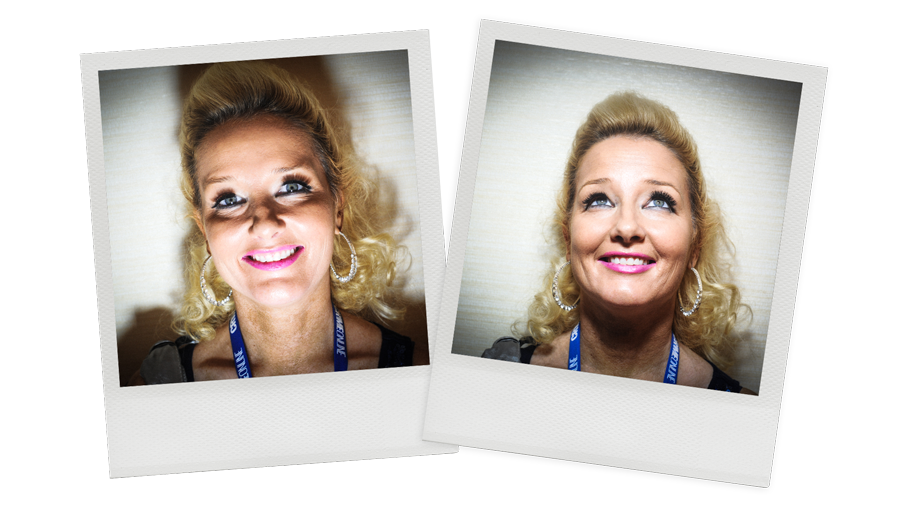
Name: Tiffany Guthrie
Hometown: Indianapolis, Indiana
Occupation: Litigation paralegal and law student
Tiffany says Ted Bundy’s case is the most intriguing to her. “I like that he blended in with society,” she explains. Ted Bundy actually worked as the assistant director of the Seattle Crime Prevention Advisory Commission, where he wrote a rape‐prevention pamphlet for women, and wanted to become a lawyer himself. Tiffany continues, “I think a lot of people think killers are these big, horrible, scary people, but he wasn’t. I mean, he was, but he wasn’t at first glance. That fascinates me: the people that blend in. You never know.”
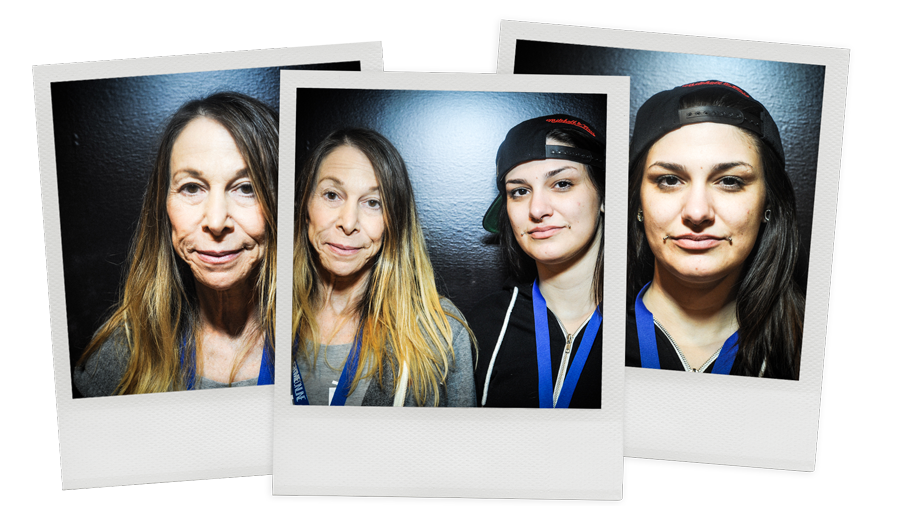
Name: Karen and Michelle (Shelly)
Hometown: Unknown
Occupation: Unknown
Karen and her daughter Shelly love immersing themselves in cold cases.
“I enjoy the challenge of true crime. I like being able to put the pieces together as fast as you can in your head,” Karen says. Shelly says her mom is “one of those that in the first few minutes of a true crime show already knows who did it.”
“It’s trippy,” she says.
Karen questions why the police force and the FBI are male-dominated when “there are so many female victims.” She finds men more emotionally detached than women because “being more emotional, women probably have a greater ability to empathize with the victims and their families.”
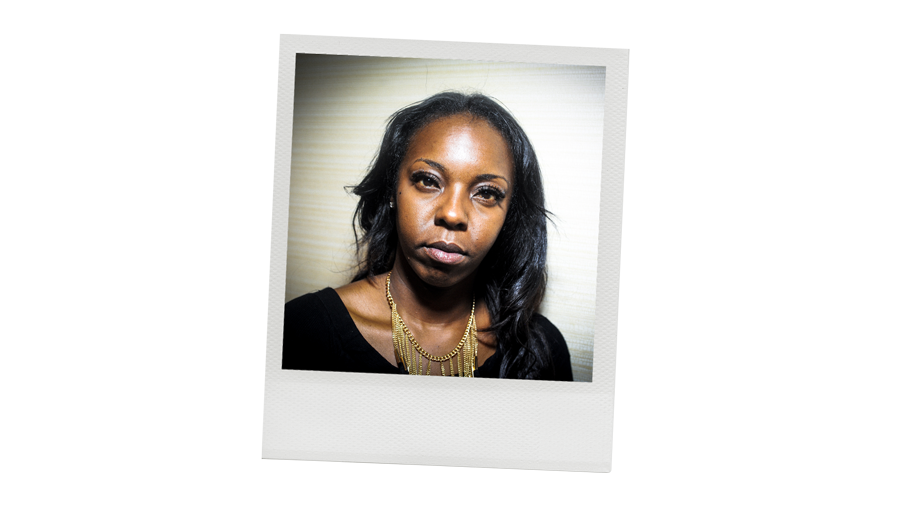
Name: Jackie Marshall
Hometown: Atlanta, Georgia
Occupation: Filmmaker and producer
Jackie traveled to CrimeCon with a production team working on a docu-series called Are We Famous Yet??? about their friend and aspiring model/actor Ryan Singleton. In 2013, Ryan’s body was found in the desert in Baker, California.
“We found out he was missing, and 74 days later, he was found murdered with no organs. We’re filmmakers on a journey to uncover what happened.” The docu-series started out as a day in the life of Ryan’s journey to Hollywood to pursue a career in modeling and acting. The filmmakers hoped to document his road to stardom. Jackie, who was onboard at that point, says they wanted the piece to be “like a real-life Entourage.”
During the time in which they were filming, Ryan took a trip to Vegas. On his drive back to LA, his car broke down in the Mojave Desert. He flagged down the highway patrol who gave him a ride to a gas station, but from there, Ryan was never to be seen alive again. He was reported missing on July 9, 2013.
On September 21, 2013, his decomposing body was found by a group of joggers. Ryan’s mother Iris Flowers said the police informed her that her son’s body was found with no eyes, heart, lungs, liver or kidneys. The San Bernardino County Coroner’s Office suggested that the organs were likely taken by scavenging animals, but Singleton’s family and friends continue to search for the truth.
“We’re just continuing out the journey that Ryan began. In the middle of his journey is when he went missing. We’re here trying to link with investigators who can help us get answers.” It’s been four years since Ryan’s body was found, and the case remains unsolved. “We’re still scrambling,” says Jackie.


Name: Kathleen Bucker and Julia Wolynes
Hometown: Houston, Texas
Occupation: Unknown and student
Kathleen brought her daughter Julia to CrimeCon as her high school graduation present. Julia will be studying pre-law at the University of Texas at Austin, where she will be in a co-ed environment for the first time in her academic career. She says, “When you hear the statistic that 15 percent of women have been sexually assaulted, that’s something every girl is worried about. Coming from an all-girls school, we’re scared to go to college.”
“I want to help and protect other women. I have friends who have been assaulted. I know the University of Texas has groups to voice concerns, but I want to start a hotline if they don’t have one already — a rape crisis and support hotline to follow in my mother’s footsteps,” she continues.
Her mother Kathleen elaborates, “When I was in college, I did work at one of the earliest rape hotlines, and I was a worker in a shelter for battered women.”

Name: Sherry and Miranda Jones
Hometown: Dyersburg, Tennessee
Occupation: Unknown
Miranda says, “When I was really little, my dad would tell me scary stories to fall asleep. I always watched horror movies, and then I kind of graduated to true crime.” She likes reading about Jeffrey Dahmer and plans to go into a crime-related field. She fantasizes about the possibilities. “Maybe the FBI, where I could work on major cases,” she says.
Her mother Sherry has always been into true crime. “When I was a child, my grandfather would always bring me to the court house. I sat through court cases my whole life. It’s addictive, trying to uncover the truth, digging right down to it. The truth is black and white; there’s not really a grey area,” she says.
“But when a case is unsolved,” Miranda adds, “it drives you crazy.” The unsolved mysteries are what keeps them hooked on the cases.
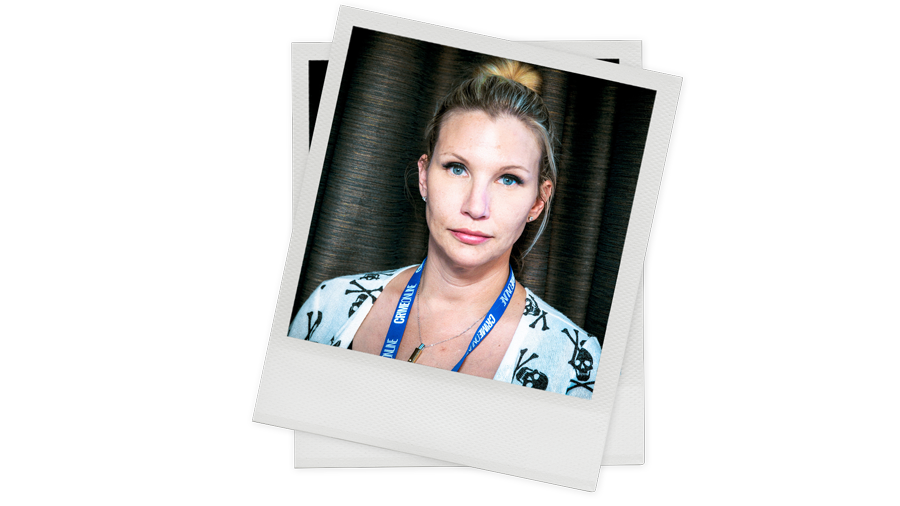
Name: Sonya Kemp
Hometown: Corona, California
Occupation: Unknown
Sonya says she “wants to figure out how the brain switches. What happens that makes someone able to kill? Are they born with it? With some people, it’s their upbringing, and then there’s someone like Jeffrey Dahmer who had such a nice family, and then he just ate people.”
She got into true crime when she was 15. “I remember when I was 18 and pregnant, I was reading books on why children kill their parents,” she says. “My parents thought I was weird, and all my friends thought I was weird.”
“My daughter is [also into true crime]. She’s the one I was pregnant with when I was reading those books. She likes seeing the real stuff; she doesn’t like the dramatization. My son is 10, and he thinks I’m a murderer in disguise.”

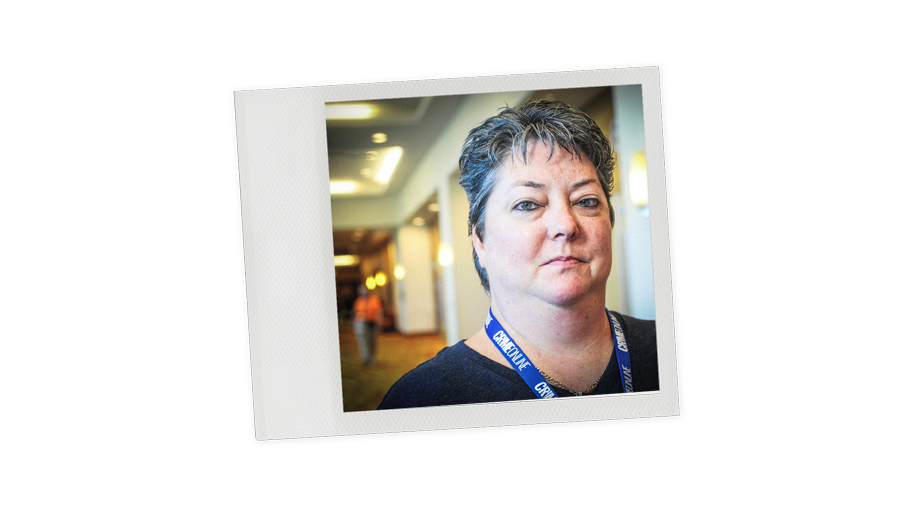
Name: Holly Jewett-Reynolds
Hometown: Dublin, Ohio
Occupation: Unknown
Holly’s wife was a police officer for over 20 years, and she is now an investigator for the government. She says she always had a dream to become a cop herself because she had the desire to “help people alleviate their pain, to help them find some kind of justice.”
She tells me that when she saw retired FBI agent and NYC prosecutor Jim Clemente speak, he pointed out that the majority of the people in his audience were women. She says she agrees with his theory that since women are typically nurturers and caregivers, they want to protect their loved ones.
“That’s why we’re here,” she says. “Maybe we can help prevent our loved ones from becoming victims. I was talking to my sister about it last night, and I said, ‘It really makes sense. That’s our nature.’”
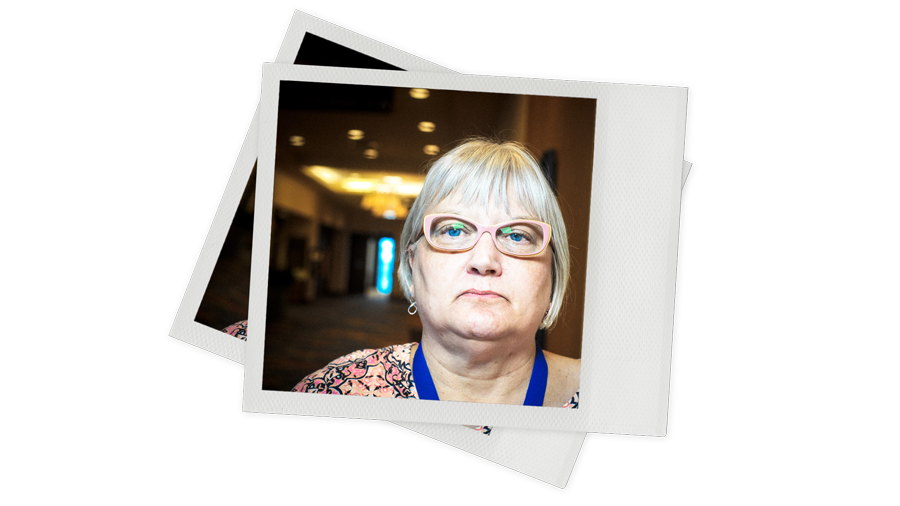
Name: Sally Burns
Hometown: Unknown
Occupation: Unknown
Sally is at CrimeCon with her daughter for her birthday. Her daughter got into true crime because of Steven Avery, and Sally got into the genre because of OJ.
“[With true crime], you realize there’s a lot more to people than what you think there is, and there are a lot of psychological aspects to people you don’t know about,” Sally says. “I think that’s what makes it so interesting to women. We’re much more detail-oriented than most men. It’s a little bit gossipy as well, so that might play into it as well.”
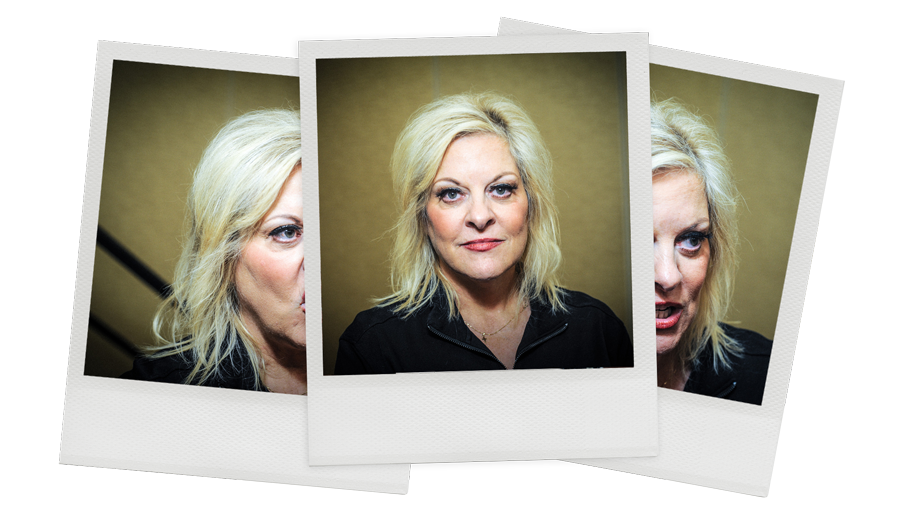
Name: Nancy Grace
Hometown: Macon, Georgia
Occupation: Television host and journalist
Age: 58
“Well, ladies, think about it: Who thinks more deeply? Men or women? I mean, if you look at the whole creation, you started with the mud and the dirt and the water, and then you got an insect, then you got a frog, then you got a monkey, then you got a man, and at the top of the creation is the woman. Obviously, she’s the deep thinker. [Looks to a man.] No offense, dear.
If you look, women are more verbal, and I think very often they’re more analytical. Women survive in different ways than men survive. We don’t survive on our braun and physical strength. Add that to the fact that the overwhelming statistical evidence is that women and children are the most likely to be victims, crime victims. So it is no surprise to me, given those two factors, that women are interested in true crime.
And what really burns me up is when crime is referred to as entertainment. Why is the death or the abuse of a child in The United States less important than a murder or attack overseas? How does that somehow merit our concern when our own homicide and abuse statistics in the US are glossed over? I don’t like that.”
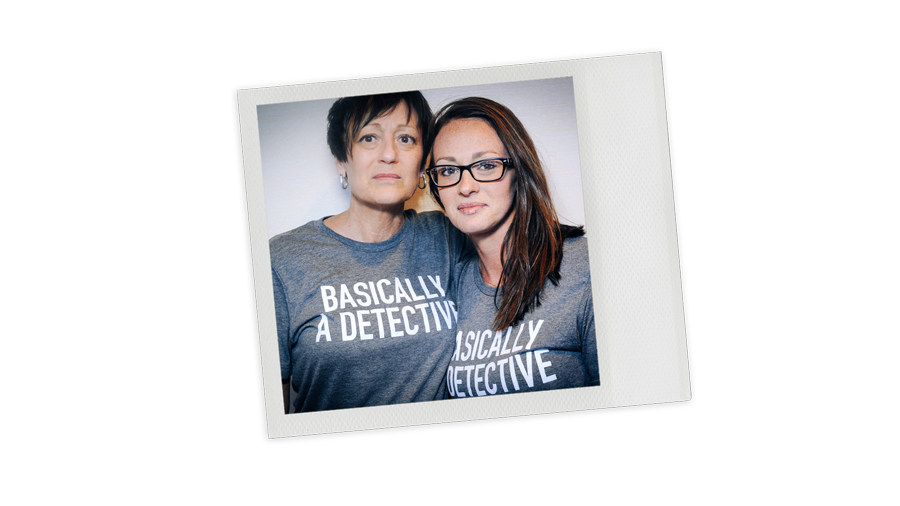
Name: Lindsey and daughter
Hometown: Unknown
Occupation: Unknown
“I probably got [my daughter] hooked on true crime. Just years and years of watching different shows. I grew up watching unsolved mysteries,” Lindsey says.
Her daughter says, “Back in the day, we didn’t have the selection that we have today. We had America’s Most Wanted and those kind of shows. I can’t explain the draw. It was just an odd fascination, I guess, the figuring out why. Why would someone murder another person? You’re there, and then you’re not. I tend to be very analytical, so I have to be able to understand things and put them in order and place.”
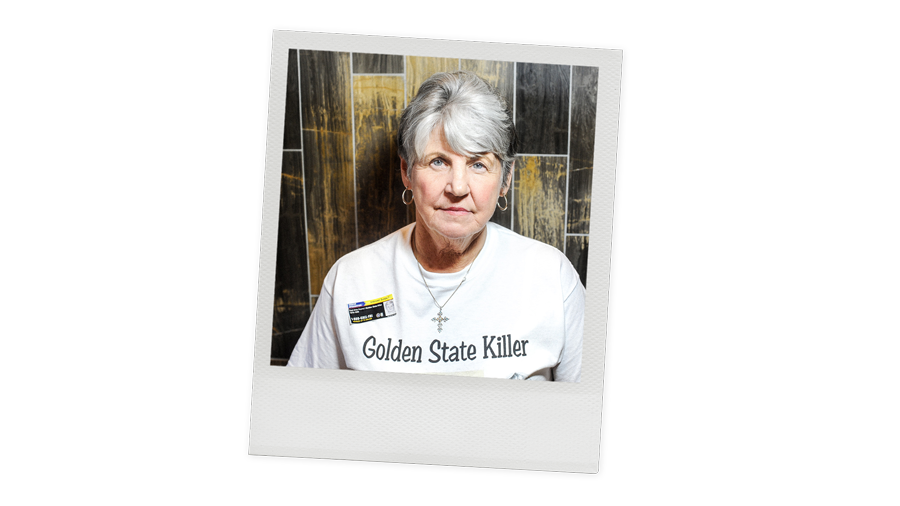
Name: Jane Carson-Sandler
Hometown: Northern New Jersey
Occupation: Author and speaker
“The Golden State Killer raped 50 and murdered 12. I was his fifth victim as far as the rape was concerned. Men aren’t victims like women are victims. We’re so passionate about catching these monsters that hurt others because we want to help other women. One of the women I spoke with yesterday, her mother was brutally murdered, and another woman on the panel had a sister who was brutally raped and bludgeoned to death. A lot of us have our own stories, and when you come here, it actually frees you to be able to share those stories with someone else.”
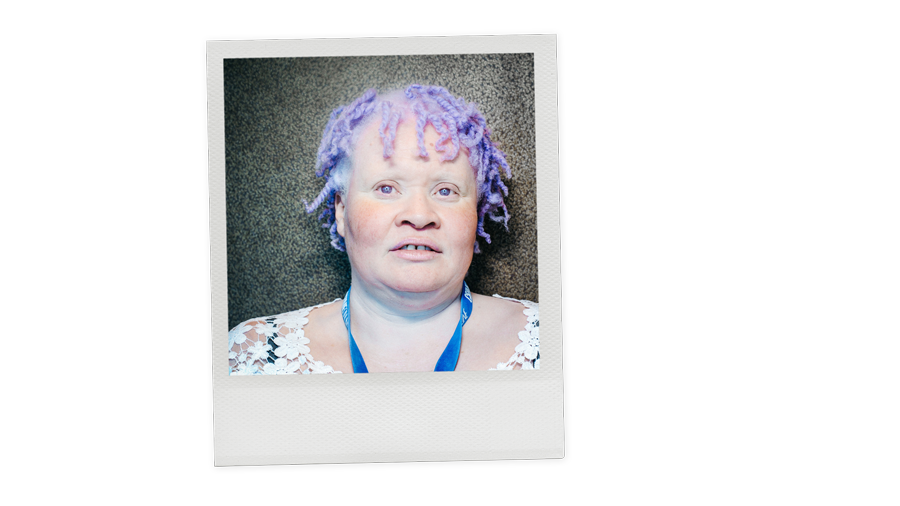
Name: Missy K. Clark
Hometown: New York Area
Occupation: Unknown
Missy tells me about her first experience with crime:
“It happened kind of by accident, when I was pregnant with my first child. I was 24, and I was coming back from a friend’s funeral. He had terminal cancer. I came home. When you’re pregnant, you have to go to the bathroom a lot, so I jumped in the bathroom, and my husband said to me, ‘Missy I got you some news.’ I said, ‘What?’ He said, ‘Your father’s dead.’ I said, ‘Stop, I just saw the man a few days ago. Stop messing around. Peter, stop, I’m pregnant. Stop messing around.’
From the gist of it, he was coming back from a party in Harlem, and he was late coming home. He was by himself, and he was hit and killed by an oncoming A train. I was stunned, but I kept things in perspective for my daughter’s sake. As a result of the stress, she was born prematurely, but she’s okay now.”

Name: Kimberlie Massnick
Hometown: Stuart, Florida
Occupation: Criminologist, specializing in sexual offenders and serial killers, and assistant professor of criminal justice at Indian River State College
Kimberlie says she got into the field “1,000 percent” because of her own experience with domestic violence. </p?
“The more I learned, the less I was afraid,” she tells me.
“At the time, I was a 21-year-old kid just doing my thing. I was engaged to a guy who was from a prominent family in the community, and he drank and liked to get his way. He had a little too much to drink one night. He didn’t like something I said, and he hit me upside the head with a beer can. I called 911, he broke the phone, and he hung me off a three-story balcony. The case got plead out as disorderly conduct,” she explains.
“[When I started teaching] is when I started to speak about it. So, I was closed off about it for about 10 years. I didn’t really speak openly about it. Now I just talk to my students and co-workers and everyone else because I don’t want it to be a hidden thing. [Points to her friend.] She’s the first person I told about it. Her family is from a law enforcement background. So I gained strength from her, and it just kind of went from there. [Looks at friend.] I was able to talk to you, and you weren’t judgemental. She let me talk about it and then move past it.”
She tells me that once she started regarding her domestic abuse case as something that happened to her as opposed to something that defined her, she was able to start moving on.“I think I identified as a victim, and now I don’t say I was a victim. I don’t even consider myself a survivor.”
The first time Kimberlie was publicly open about her story was at a seminar for young girls. “I told them if it could happen to me, it could happen to anyone. They look at a criminal justice professor who has a black belt in martial arts and who is obnoxious, loud and outspoken. They would never think that I could get myself in that position. They need to realize that anyone can be a victim,” she explains.
Kimberlie tells me the most rewarding part about telling her story was the connections she got to share with other women. “The week I told my story, I had two students who were dealing with major issues of their own come to me. So now because I told my story, two people are safe. It’s not just one here and one there. It’s millions of us everywhere who have these experiences,” she says.
All photos by Kelsey Bennett

